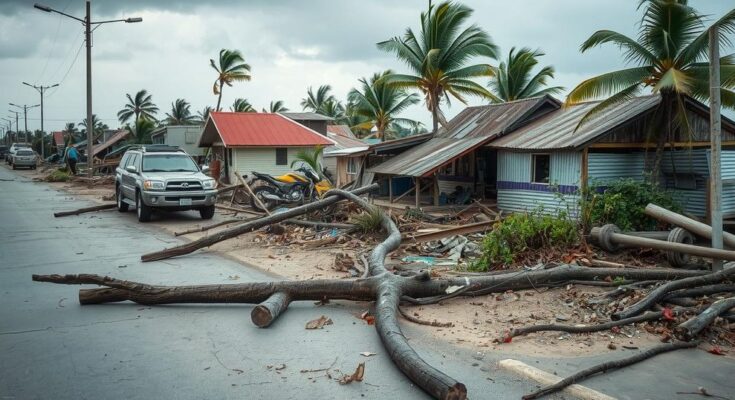Cyclone Chido has caused widespread devastation in Mozambique and Mayotte, killing at least 94 individuals in Mozambique and 35 in Mayotte, with significant infrastructure damage affecting healthcare and education. The storm has left hundreds of thousands impacted, emphasizing the need for improved climate resilience and disaster management.
Mozambique has suffered devastating consequences from Cyclone Chido, which has taken the lives of 94 individuals since its landfall on December 15. This powerful storm, characterized by winds reaching 260 km/h (160 mph) and an astonishing 250 mm of rainfall within its initial 24 hours, has also left approximately 768 people injured and over 622,000 affected in various capacities. Significant infrastructure damage has been reported across multiple sectors, particularly education and healthcare, severely limiting access to essential services. The National Institute of Risk and Disaster Management (INGD) confirmed that over 109,793 students have been affected due to damage to educational facilities and that 52 sanitary units were compromised, hindering public health efforts.
In addition to its toll in Mozambique, Cyclone Chido initially devastated the French territory of Mayotte, where it was the most destructive storm in nearly a century, resulting in at least 35 confirmed fatalities. As recovery efforts progress, officials express caution that the death toll may rise substantially due to the extensive damage across the islands. More than 1,300 relief officers have been dispatched to assist the local populations, and the French interior ministry continues to deliver essential supplies daily to those in need.
Cyclone Chido serves as a stark reminder of the vulnerabilities faced by regions prone to tropical cyclones, particularly in the context of climate change. Cyclones are intense weather phenomena characterized by high wind speeds, heavy precipitation, and hazardous storm surges, causing widespread destruction and displacement. The Intergovernmental Panel on Climate Change (IPCC) has indicated that rising global temperatures contribute to more severe weather patterns, including increased precipitation associated with tropical cyclones and heightened storm intensity. These findings emphasize the importance of resilient infrastructure and comprehensive disaster management strategies to mitigate the impact of future climate-related events.
The devastation wrought by Cyclone Chido in Mozambique and Mayotte underscores the critical need for improved disaster preparedness and response mechanisms in the face of climate change. The loss of life and significant disruption of essential services highlight the vulnerabilities inherent in regions affected by such natural disasters. Moving forward, it is imperative that governments and organizations prioritize resilience building and sustainable infrastructure to safeguard populations against future cyclonic events.
Original Source: www.bbc.com




